#the patriot extended cut
Explore tagged Tumblr posts
Text
On my last rewatch of The Patriot I stuck around for the end, which I have done so rarely in the past 20 years that it is practically as new for me as the scenes cut from the original release that were added back for the extended cut. Needless to say. there is a lot to unpack.
An idea that is repeated multiple times in the film’s last ten minutes is that the American victory made a drastic and immediate difference in the lives of most people. Writing to Charlotte after the Battle of Cowpens, Martin says, “My hope and prayer is that the sacrifices borne by so many will spawn and fulfill the promise of our new nation,” A similar sentiment is present in General Cornwallis’s regretful words to General O’Hara once the war’s outcome becomes certain: “Everything will change. Everything has changed.”
Has it really, though? In the film’s final scene, Martin arrives at the site of his home that Colonel Tavington burned with his five surviving children, a new baby, Charlotte, who is now his wife, and Cornwallis’s two Great Danes. A group of men, including two members of the South Carolina militia, are building a house with the same outline as the one that stood there before. Occam, the Black man who had earned his freedom by serving in the militia, explains: “Gabriel said if we won the war we could build a whole new world. Just figured we’d get started right here with your home.”
In spite of what the audience is told about change, what we actually see is everything being put back just the way it was. Before Martin returns home, he learns that his friend Harry Burwell has just become a father and named his son Gabriel, and now he has a new child of his own. Two new babies to replace to two sons Tavington murdered. I can’t help thinking of that Tumblr post where Lestat de Lioncourt, another callous bitch, says this in reference to his husband Louis’s anguish about having almost eaten his nephew: “And then he got so upset about the baby, like they couldn’t just make another one!”
The only family member present at the film’s end who is not there at the beginning is Martin’s wife, but Elizabeth, recently dead when we meet the Martin family, was Charlotte’s sister. Martin got as close to simply replacing her as he possibly could. He even has a brand new Not A Slave A Free Man to replace the ones Tavington kidnapped who also, apparently, lives to serve him out of gratitude.
Before the war, Martin was a respected landowner and famed war hero, but after . . . wait, no, he’s exactly the same. The question remains: is Benjamin Martin a man who has made great sacrifices in the cause of independence, or a man who is rewarded for his service to that cause by having every person or thing he has lost--and given The Patriot’s treatment of women, children, and Black people, there is little distinction between the two--restored to him? As I’ve found myself saying about this infuriating movie many times before, It Cannot Be Both!
#the patriot#the patriot extended cut#benjamin martin#charlotte selton#occam#william tavington#a lestat cameo
8 notes
·
View notes
Text
While it’s still technically the 4th… Curtis gang as patriotic muscle shirts…
Ones that aren’t already muscle shirts they’d probably cut themselves, as god intended. Would’ve posted sooner but I’ve been out all day
Pony-
Understated, classic.

Soda-
One for the dramatic statement and a statement of loyalty. Being patriotic becomes a contest… he likes contests

Darry-
Unofficial leader in an official t-shirt. He and Steve are typically the ones to set things off, but like usual everyone looks to him.

Steve-
Cars. Consistency. Loyalty.

Twobit-
There were so many I could choose from but this sounded like something he’d say.

Dally-
No comment.

Johnny-
Part of a in group with the gang, proud of it. Can extend to country on occasion.

#the outsiders#outsiders 1983#outsiders#Curtis gang#4th headcanons#ponyboy curtis#sodapop curtis#darry curtis#steve randle#twobit mathews#dallas winston#johnny cade
65 notes
·
View notes
Text

This image by Doug Mills NYT of today's new conference is really something.
(Amy Siskind)
* * * *
Special Counsel: "Trump would have been convicted."
January 14, 2025
Robert B. Hubbell
[Note: Due to the late release of the special counsel’s report, this newsletter is a bit disjointed. I wanted to publish on schedule despite the late-breaking news, so I ask your understanding for the seeming lack of organization.]
Last Saturday, I spoke to readers on a Substack livestream. My thesis was that the next week will be among the most challenging we will face as Americans who care about the rule of law.
We will witness a president-elect—who tried to overturn the Constitution in his prior term—swear that he will “preserve, protect and defend the Constitution of the United States”—words that will metastasize into a lie the moment he utters them. He will desecrate the Bible on which he places his hand.
The oath will be administered by a Chief Justice who granted the president-elect immunity from criminal liability, freeing Trump to ignore, attack, and undermine the Constitution.
We will watch confirmation hearings in which woefully unqualified nominees are hypocritically defended by a Republican Party that pays lip service to patriotism, law and order, and morality—except when it comes to GOP nominees credibly accused of rape, sexual assault, addictions, national security concerns, and promises to use the DOJ to exact vengeance on the president’s political opponents.
Those anticipated events are enough to make a rational person take to their bed and pull the covers over their head for the next four years. But it gets worse. Trump and MAGA are threatening to hold the victims of the Los Angeles wildfires as hostages to their efforts to raise the national debt limit (necessary to extend the 2017 tax cuts to billionaires and corporations). See Daily Beast, Republicans Float Holding California Fire Aid Hostage for Key Trump Policy.
It simply doesn’t get any more despicable than that. Every Republican who suggests that aid for victims should be conditioned on tax breaks for billionaires deserves their own circle in Dante’s Inferno.
Today’s newsletter touches on a fair number of stories that can be viewed as “bad news.” Readers sometimes tell me that they stop reading such newsletters. I get it. But I don’t make up the news; I just comment on it.
The advice that I gave to readers on Saturday is that they should adopt two strategies to remain engaged during rough times:
First, don’t collapse the future into the present moment. The future comes at us one day at a time. We will have time to deal with potential crises as they unfold. We don’t have to “fix” everything today. To be sure, we should plan, prepare, and strategize. But not everything we are worried about will materialize. We may successfully stop or delay threats from materializing.
Second, maintain “emotional distance” from bad news. Recognize that you can’t control most of what Trump says or does. Given that fact, recognize that unchanneled anxiety and fear will not change the outcome. Focus on what you can do to change, impede, obstruct, or reverse policies we oppose. I am not saying “Don’t care” or “Hide your feelings.” Feeling anxious or fearful is understandable and natural. But recognize that we have a professional responsibility as citizens to remain informed so we can be effective advocates for the rule of law.
Okay, with that longer-than-usual throat clearing, let’s look at the stories that came at us with high velocity and frequency on Monday.
Judge Cannon continues to act in a lawless manner by obstructing release of portion of Jack Smith reports
Judge Aileen Cannon continues to issue orders regarding the reports of special counsel Jack Smith. As to the portion of the report relating to Trump's unlawful retention of national defense documents, Cannon has slowed the release of that document—including to Congress. Her order permitted the release of the portion of the report relating to Trump's election interference—a case over which she has no jurisdiction.
See MSNBC, Jack Smith's report on Trump election interference set for release after Cannon order
By the time you read this newsletter, it is highly likely that a portion of Jack Smith’s report will have been posted on the DOJ website. If so, I will address that report in Tuesday evening’s newsletter.
Judge Cannon’s unrestrained, lawless assertion of jurisdiction over matters plainly beyond her constitutional authority is a scandal for the federal judiciary. At one point in her order issued on January 13, Cannon says she doesn’t understand why the report regarding the national defense documents needs to be released to Congress. Cannon knows full well that one of Trump's nominees under consideration by the Senate (Kash Patel) is mentioned in the special counsel report.
Her order denying the report to Congress is nothing less than an effort to interfere with the Senate’s constitutional duty of “advice and consent.” See Emptywheel on Substack, Aileen Cannon Interfering with Chuck Grassley and Dick Durbin's Constitutional Duty.
Both the 11th Circuit and the US Supreme Court are to blame for Cannon’s lawless actions—actions that undermine the faith of the American people in the third branch of government. Removal of Cannon from the cases (if not the bench) is long overdue.
UPDATE: Jack Smith’s report is released; says Trump would have been convicted
Per the NYTimes, Jack Smith’s report on Trump's election interference was released on Tuesday morning. See New York Times, Special Counsel Report Says Trump Would Have Been Convicted in Election Case. (Accessible to all.)
Per the Times, the report concluded:
The department’s view that the Constitution prohibits the continued indictment and prosecution of a president is categorical and does not turn on the gravity of the crimes charged, the strength of the government’s proof or the merits of the prosecution, which the office stands fully behind.
Indeed, but for Mr. Trump’s election and imminent return to the presidency, the office assessed that the admissible evidence was sufficient to obtain and sustain a conviction at trial.
Jack Smith’s reached the right conclusion—as is obvious to anyone who watched the January 6 insurrection and related coup unfold on live television.
Hearing on Hegseth nomination set for Tuesday
Despite his manifest unfitness, Pete Hegseth will sit for a confirmation hearing in the Senate on Tuesday. Hegseth lacks the experience and temperament to run a 2 million+ person organization. Hegseth has been accused of rape and sexual harassment. He has been accused of financial mismanagement. His chest is tattooed with symbols associated with Christian nationalists. He opposes women in combat positions in the military. He opposes diversity initiatives in the military.
Trump and his acolytes have turned support for Hegseth into a test of loyalty to Trump. See Intelligencer, Pete Hegseth Is a Test.
The FBI appears to have omitted important witnesses from Hegseth’s background check—including his former wives and the woman who told police in 2017 that Hegseth sexually assaulted her. See NBC News, Pete Hegseth's FBI background check doesn't include interviews with key women from his past.
Hegseth faces a long list of allegations of misconduct. See Mother Jones, A Running List of the Allegations Against Pete Hegseth – Mother Jones. We should expect Republicans to run interference for Hegseth while Democrats try to uncover the truth about Hegseth’s past.
[..]
Concluding Thoughts
January 20, 2025, is Martin Luther King Day. It is also Inauguration Day. I know that many readers will make plans to avoid watching the Inauguration. I know I will—because the Inauguration of Donald Trump will be a moment of national disgrace and desecration rather than an occasion for celebration of the peaceful transfer of power.
If you have other plans, I encourage you to keep them. But if you do not currently have other plans during the Inauguration, join me on a livestream on Substack. While I don’t have the program planned (because of the fires in LA), I intend—among other things—to read portions of Letter From Birmingham Jail and other appropriate documents. I am open to suggestions.
I can’t promise a glossy, high-value production. I can promise we will be together in community on a difficult day for everyone who holds America dear. Details to follow.
Stay strong! Talk to you tomorrow!
[Robert B. Hubbell Newsletter]
#TFG#circus barker#Amy Siskind#press conference#Robert B. Hubbell#Robert B. Hubbell Newsletter#incoming
20 notes
·
View notes
Text
Playing Soldier: Chapter 8
Read on AO3. Part 7 here. Part 9 here.
Summary: You were thoroughly unaware of William Tavington's affinity for nature.
Words: 5000
Warnings: Some blood
Characters: William Tavington x Reader
A/N: Cowritten with @bastillia <3
HELLOOOO, welcome back to chapter 8 - back in the vicinity of our wonderful bastard and enjoying alone time with him <3
If you've not seen the extended version of The Patriot, you may be unaware of a few cut scenes of Tavington that expand a bit on this portion of his character - allow me to enlighten YOU to my favorite (for multiple reasons) -
Heart of a Villain
Regardless, we are so so grateful to your thoughts, input, engagement as always. It means so much to hear people's thoughts and reactions to what we write! Genuinely what any fanfic author strives for. We love you! <3
“Be still.”
Over the past two weeks in the field, you’d become extensively familiar with Benedict Goddard’s tendency to sit for treatment like a wiry cat. Today—as he arrived to the medic tent with a contusion to his forehead—was no different.
“Oh, please, please be careful with him!” Lottie called from beyond the canvas. “He’s tender, you know, he got such a knock on the head, please make sure—”
“Lottie,” you replied. “He’s in good hands, all right?”
“That’s right,” Goddard added, eyeing you with caution despite his attempt at reassurance. “Don’t fuss, sister.”
Normally, Lottie would have preferred to treat her own brother. But the excess of blood that had spilled from his brow, paired with the general excess of men currently occupying your tent sporting bayonet wounds, had turned her too green to volunteer.
“Funny for you to tell her not to fuss when you insist on squirming,” you mumbled.
He huffed, easing away from you. “You’re being rough, that’s why I’m squirming.”
First, of course, he’d have to cooperate.
“I'm not rough.” You chased his forehead with a cloth, dabbing hard at the split above his brow. “You’re sensitive.”
“Ah! Is that what you say to every soldier?” He winced. “That hurts! I’m an officer, you can’t just—”
“And I’m a nurse.” You frowned. “And officer you may be, but you’re not the only man in this tent needing treatment.”
As if on cue, another soldier groaned out in pain behind you. You craned around to see that one had removed the lint packing from his gunshot wound, which now spurted a crimson river down his leg.
“I told you to keep pressure on that, Evans,” you snapped, pointing, “or are you keen to lose the damned leg?”
You turned back to Goddard, swooping back in on him with the cloth. He yelped.
“Next time,” you said, finally revealing a bit of the wound’s edge through the blood, “perhaps you’ll think twice before engaging in a jousting match with a tree.”
“It wasn't a tree. Ow! It was a rebel. Bastard dragged me off my horse.”
You snorted. “Perhaps practice better riding, then.”
“No wonder everyone says you're so mean,” he grumbled.
“Mean?” You gawked. “What do you mean, ‘mean’?”
“You're just—ah—well, you're not exactly gentle, are you?”
You rolled your eyes. “I don't hear any complaints about wounds healing poorly.”
Goddard simply grumbled something about plenty of other complaints, and conceded to your efforts to make him hold the cloth in place himself while you considered the table of instruments beside you. There was still plenty of lint for staunching the bleeding, but…
Frowning, you glimpsed the wound over his eye. It was already bleeding through the cloth. The chances of a blood malady were higher than you'd like—and should that occur, the potential for him to lose his eye would multiply like rodents in spring. If he were Grace and you were a stranger, you'd want the stranger to do anything they could to prevent that.
The bottle of whiskey sang to you from the edge of the table. You picked it up.
“What are you playing at?” Goddard whimpered, beginning to recoil again. “You can’t very well amputate my head, so I can’t see any reason—”
“Stop being so theatrical,” you said, tipping some whiskey onto a fresh linen. “I’d be finished already if you weren’t making such a fuss.” You turned back to him, soaked cloth poised, and motioned for him to remove the soiled one from his head.
He clutched it in place protectively. “You’re mad.”
“Trust me.”
“No!”
You scoffed, patience rubbing thinner than an old billet. Your voice rose. “Ensign Goddard, remove the cloth.”
He ducked as you reached to snatch it from his brow, leaning away from your advance. You pursued.
“I’ll not let you mangle me with your—your speculative medicines!” He planted a hand on your hip to keep you at arm’s length. Redirecting, you reached to cup his cheek and forced his face back around to yours.
“I’ll mangle you with something else lest you—“
The tent flap flew open, letting in a gust of summer air.
“What’s this racket?”
Goddard stiffened. “Colonel, sir.”
You stalled. Without releasing Goddard, you turned to see Colonel Tavington standing in the middle of the tent, hands at rest behind his back, eyes glittering with irritation. His focus snapped to Goddard’s hand on your waist, then to your own hand on his cheek, the curl of your fingers along his jaw. Then he found your gaze. Swallowing, you threw Goddard off and straightened.
“Colonel,” you began, “I’m simply following what I know to be the best procedure for this particular type—”
“No, sir, she’s not!” Goddard said. “What she’s doing is madness—”
“—of wound, I’m preventing a blood malady—”
“—and doesn’t follow any standard of care—”
“—so his target-sized forehead heals properly!”
“—so if you could please just bring in my sister!”
Tavington stood, now staring straight between the both of you, like the tent wall would explain why the two worst people he’d ever met were both shouting him down. A slow breath left him, and he looked to Goddard.
“You’re correct, Ensign,” he said. “What she’s doing is madness.”
Your jaw dropped. You were going to kill him.
Goddard moved to scramble away. “Thank you, s—!”
“However.” Tavington paused, waiting for Goddard to settle back to where he’d been. “You shall allow her to do it.”
Or, perhaps, you wouldn’t.
He balked. “Wh… Colonel, she’s attempting to put alcohol on my—!”
“I am aware.” He turned to exit the tent.
“With respect, sir, if you’re so keen on her methods, why don’t you allow her to treat your wound?” Goddard said. “I saw you become well-acquainted with a bayonet.”
Tavington paused. “It’s nothing,” he replied. “You have your orders, Ensign.” He met your eyes briefly, his jaw tight. Then he disappeared behind the flap.
Chin raised toward the sky, you turned to Goddard, smiling. “Your orders, Ensign.”
Goddard glared at you, releasing the cloth from his forehead. “Just. Finish up.”
“As you wish.” Feeling a bit merciless in your vindication, you slapped the whiskey-drenched rag to his wound.
He screamed.
The rest of the afternoon passed as a red blur, pierced with the silver flash of a suture needle. By the time evening bruised the sky, you’d managed to make neat work of each man’s wounds, and your pulse had migrated to the raw, aching pads of your fingertips.
It was remarkable, based on the carnage, that no man had been killed outright in the morning’s fray. Even more remarkable perhaps that none had bled out in your tent. Part of that could be attributed to your sheer determination to keep the casualty count at zero. If nothing else, simply to prove that you could.
All that was left now was to wait for your handiwork to pay off in perfect healing. You knew that it would. But that didn’t stop the claws of fatigue that raked you from scalp to toes as you sank down beside the cooking pot and glanced across at the group of women seated in a circle, their backs like a fortress wall to you.
The handful of wives that Tavington had permitted to follow camp were sitting down to supper, several of them patting and cooing at a very pale Lottie who stared into her bowl as if it were one hundred yards deep. To her credit, she had tried to help—while fighting through fainting spells to do so—but she’d tried.
You sighed, poured yourself a bowl of stew and, after ensuring the cooking pot was empty, commandeered it. You’d finish your meal later. Since you’d forced the last of your alder bark decoction down a soldier’s throat earlier in the day, you needed to start on another batch. First you needed to gather water and start a boil, so you hauled it down to the river.
The interaction you’d had with Tavington today had been the most meaningful you’d had since your decision to join his legion. In fact, you couldn’t think of a single word you’d exchanged with him after he’d left the hospital. It made his behavior today all the more strange. It was clear he trusted you—even valued your skill with his men—but all he seemed capable of doing to communicate that fact was to stare at you.
You waddled back to camp once your pot was full from the river, water sloshing over the lip. It was frustrating enough to meet Tavington’s eyes over and over again, a bid toward connection that he reflexively denied, but even more so to do it in a daily crowd of strangers. The longer it had gone on, the stronger the impulse became to know exactly what possessed his thoughts.
You hated that.
Sighing, you hung the pot over the fire, became its sentry as it waited to boil.
Is this all a man had to do in order to arouse your interest—your desire? Thrust his hard cock against your thigh and then refuse to willingly speak to you ever again?
If only the boys at church had known.
You sorted through your pockets. There were still a few ingredients you wanted to gather before the day was out, but it could wait.
Reluctantly, you admitted that your draw to him went beyond physical hunger. William Tavington was perhaps the only man who to you seemed unreadable; the only man to incite your curiosity. He was certainly the only man besides your father who had ever acknowledged your capabilities, and he’d only needed to meet you a single time. Since then, he’d never underestimated you again.
It infuriated you.
Tiny bubbles gathered in the belly of the pot.
It electrified you.
Grumbling to yourself, you measured out what you needed from your supplies. You supposed it wasn’t important what you thought of William Tavington, or what he thought of you. What simmered between you would never be given heat. You were on two opposing sides of a war, each with a life’s investment in the other’s annihilation. Even if he were a different man—the kind of man you could gift with your virginity and not feel traitorous—anything between you would wither and rot in the blood-soaked earth under your shared bed.
You hummed, tossing in handfuls of bark as the pot burbled to a boil.
“Brewing new concoctions already?” said one of the wives—the one named Alice, you realized—tossing a look over her shoulder. “Was yesterday’s batch not sufficient enough for you?”
“Decoctions,” you said, glancing up at her. “And no. I ran out today, in fact.” Had she not noticed the wounded men wobbling in en masse?
Alice frowned, scrunching her little golden locks into her bonnet. “How much of that stuff are you using on our soldiers?”
“I'm using whatever I feel sufficient or appropriate for the issue presented to me,” you replied.
“And where did you receive training on these methods?” Her voice seemed a little strained. “I don't remember seeing a physician ever use these… I don't know, soups?”
Lottie offered a weak grin, sitting forward. “Alice, she just treated your husband today, aren't you glad for that?”
“Perhaps! Perhaps not,” she said. “We don't know where she's getting these ingredients she uses—”
“Yes, you do,” you replied, an edge entering your tone. “You physically watch me gather them.”
“But they could still cause disease!” Alice sat up straighter, gesturing to the other wives. “You've treated half of our husbands today and with practices that doctors don't even use.”
An involuntary laugh escaped you, and you gave her a restrained smile. “And because of that, half of your husbands will keep both their feet out of an early grave.”
“Lottie, didn't she put whiskey on Benedict’s eye?” said Alice. “You're telling me you don't think that's dangerous?”
“No,” Lottie said, her face reddening instantly. “No, I trust her, she's very good—”
Alice scoffed, turning to her meal. “Then you're both mad!”
With a slow breath, you reined in your instinct to grab the pot from the fire and dump the water over Alice’s head. How would Grace handle this? You considered: The day had been long, the men returning injured had been stressful. It was far more likely that Alice’s love for her husband was inspiring her current outburst than any real animosity for you.
Perhaps she just needed reassurance.
“Alice, it's been a trying day, and I know you were frightened to see your husband wounded. I understand how you feel,” you said, though you couldn't begin to understand her hostility towards the person helping her stupid husband. “But please know that I wouldn't attempt anything on him that I wouldn't attempt on someone I loved—”
“But you don't love anyone!” Alice stood, her bowl clattering to the ground. “You don't understand how I feel! You're not married and never have been, and if you think I'm going to let my husband die from an illness brought on by witch remedies made by some… some spinster—”
You shot to your feet. “You know what—”
Lottie gasped. “Alice!”
“—next time, I'll do you a favor and let your husband’s foot rot like your fetid womb!”
Another gasp, this time from the other wives who otherwise sat in silence, their stares dancing between you and Alice. Lottie’s jaw had snapped shut, her face the color of a ripe apple. Alice glared at you, her eyes wet and furious, her mouth parted.
You exhaled, glancing at the ground. So much for emulating Grace. “I should go,” you said, backing away. “I must… um, I must… go.”
Turning on your heel, you escaped the group of women and rushed into the field beyond camp.
The sun was in its Midas hour, grass gilded and sky shimmering from its touch. Without the heat, the air had softened from wool to silk, and you relished it as you breathed. Every exhale released some frustration, albeit with the efficacy of a chisel to a boulder—a boulder that seemed ever-burgeoning since you’d met Tavington, a boulder that laughed at the Sisphyean efforts of your chisel.
You hiked your skirts to your ankles, taking long strides toward the valley where you knew you’d find wildflowers. There was the alder bark that needed gathering, of course, but you also wanted to dig into some dandelion.
Hopefully, by the time you returned this evening, Alice would be calmed. You knew you’d have to apologize, even if you weren’t really sorry. There was no reason to cause everyone to hate you.
You stepped down a length of stone, turning the corner of a hill into the valley, and stopped.
There, in your precious field of dandelions, stood William Tavington.
He’d discarded most of his regalia, his jacket hanging open as he surveyed the landscape. You swallowed, forcing your eyes to focus on the flowers instead of how the sun silhouetted him in aurelian splendor. Or, at least, you tried. And failed spectacularly.
For a moment you began to turn away, but your feet fastened roots into the ground. You weren’t going to let him drive you off—you needed those dandelions, and you certainly weren’t going back to camp. Holding your breath, you crept toward him, hoping you could grab what you needed without alerting him.
Tavington crouched, examining the patch of wild violet at his feet. A soft breath left him, his face so absent of malice that it appeared angelic. His thumb stroked the stem of one of the blossoms, following the fragile formation of the leaves until he reached the flower. Head tilting, he traced the outline of the petals with a tenderness that paralyzed you.
You couldn’t keep watching him. You shook off whatever demon had temporarily gripped you and reached for a batch of dandelion, grabbing it whole. Gaze trained on Tavington, you tested once, twice, and yanked the bunch free with a quiet crack.
His head snapped up. He twisted around.
You froze.
Tavington stood, glaring as if you’d caught him bathing. “Taken to stalking through the grass like a wild animal now, have you?”
You rose to your feet as well, back straight to match his. “Hardly.”
“Perhaps you can explain why you appear to be stalking through the grass like a wild animal, then,” he said, gesturing to the debris stuck to the hem of your skirt.
“I’m—” You shook your head, since your presence was far more explainable than his. “What are you even doing out here?”
“What do I appear to be doing?”
You shrugged. “I don’t know, admiring the flowers?”
Tavington said nothing, his brows raising in response, as if this was a perfectly typical activity for him.
If it was, you hardly had enough insight on him to know. But the grass seeds stuck to the soles of his boots, the affection with which he’d regarded the violets—perhaps William Tavington still had the capacity to surprise you. Realizing you’d been staring, you held up the flowers in your hands.
“I… I came to gather dandelions.”
He stepped back, inviting you to scavenge the stretch of them at his feet. You waited, perhaps for him to yield more ground, or to leave. He did neither. Heat building in your cheeks, you knelt down, beginning to pull stalks from the ground, wiggling to see if any of the roots would pry free. You felt his eyes following your hands, studying the way they moved. More heat, this time down the back of your neck.
The roots were well-buried—you’d need to dig them free. Grunting, you stuffed your fingers into the dirt, flinging fistfuls into the air to reveal your quarry.
Tavington side-stepped one of the scatterings. “Is that necessary?”
“It is, actually,” you grumbled. Yet another criticism of your methods. “Different parts of the plant have different properties.” You cleared a net of roots from the ground, trying to ignore the pressure of his gaze as he watched you.
“How so?” he asked.
You paused, wondering if you’d heard him correctly. Tentatively, you glanced up and met with eyes the color of clear lakes, gleaming whiskey in the light. For a moment, you forgot to breathe.
You cleared your throat, breaking his gaze. “Well.” Nodding toward the leaves in your hand, you continued, “For example, the leaves work well for reducing inflammation. Far better than bloodletting, from my observations. And, ah, the roots can help sustain a balance of the humors.”
Looking back down to your hands, you resumed plucking and separating the plant by parts, a strange, almost self-conscious heat rising to meet the scalding beam of his attention.
“And the flowers?”
You stopped again, snapping back up to look at him before you could stop yourself. Distrust settled over you like a cobweb, spun in the wake of Alice’s venom and every other insult that you’d already had to deflect today. Was that all this was, too? Did he simply mean to try and humiliate you? To punish you for disrupting his solitude?
“Forgive me, Colonel,” you said, narrowing your eyes, “but as I find myself unable to discern the nature of your interest in a topic for which you have previously expressed such ardent disdain, I must inform you that I’ll not entertain further ridicule.”
“You are implementing these remedies on my men,” he said, his voice filling with an authority that made the hair on your nape stand straight. “To the effect of considerable skepticism among them. You will therefore answer any query of mine regarding these practices, and you will answer it fully and truthfully without insolence.”
Your teeth locked together. So his meditation in nature hadn’t quelled the more irascible parts of him that you’d come to know so well. In some absurd way, that comforted you. This version of William Tavington was far more familiar. Far more predictable.
Your chin jutted forward. His eyes flashed.
Yes, this was how things should be.
“The flowers,” he repeated. “Their properties. Tell me.”
A short exhale left your lips. “They make a lovely wine,” you said, exhaustion driving you to redirect your frustrations upon another firmly-rooted plant rather than engage him in battle. “The entire plant is edible. It can supplement our rations, medicinal properties aside.”
“Hm.”
He continued to observe as you worked more dandelions from the earth. He did not ridicule you. He did not needle you further for a fight. For a moment, you half expected that he might turn and walk away.
“Where did you learn this?” he asked, breaking a silence that had spanned several minutes.
You blinked, sitting back on your heels to regard him. Once again, the bile had retreated from his gaze, leaving only a whisper of curiosity across the otherwise placid plane of his brow.
As you observed him, something deep in your belly kindled slowly to life. Something that felt hot and terrifying and good, like the first time you’d discovered your own climax. It swelled, threatened to burst at the recognition of his interest. At the possibility of his sincere trust in your skill, of his presumable willingness to defend you in the face of his own men’s misgivings. Your heart throbbed in your throat and between your legs.
“My, uh, mother,” you said, popping more flower heads from their stems. “She taught me some of it. Before she died.” Brushing the roots clean, you stuffed them away. “The rest I’ve learned through testing my own hypotheses. Extending my knowledge through practice and evidence.”
“And your father?” he asked. “He encouraged this?”
“Very much so.” You scooted forward to start on a new patch of dandelions. Tavington slid his foot back, yielding you access. “Grace was often poorly as a child,” you continued, fingers piercing the earth. “Physicians weren’t exactly in abundance.”
A quiet, thoughtful noise left him. “So you came to spurn their practices.”
“Not at all.” You frowned, peering up at him.
A tiny flash of confusion marred his brow, clearing as fast as it had come. You wrestled against the inexplicable tug of a smile, turning back to your work to hide it and clearing your throat.
“Whenever my father would go to Charlotte,” you said, “he would bring back all sorts of books and pamphlets for me. Anything he could find on the topic of medicine. I employed the latest scholarship on suturing just today on your men, as it were.”
Tavington hummed. “And the latest scholarship on whiskey?” he said. “Do enlighten me.”
Though his tone bore no rancor, you struggled not to sag. Why was this everyone’s sticking point? As if some physicians didn’t use leeches, which was objectively more questionable. You sighed.
“The evidence for its efficacy is irrefutable, Colonel, you’ve seen it yourself.” You dug up a root with a bit more force than necessary. “The same cannot be said for some modern practices.”
Your skin felt like molten iron on your bones, too hot and too heavy. You wanted to peel it free and dunk yourself in a freezing river, rid yourself of this feeling that you’d exposed your innards to him. Whatever had bedeviled you to flay yourself in thin layers for his derision, you needed to find it and squash it to a paste beneath your shoe.
“Such as bloodletting,” he murmured.
Your hands stilled, the breath evaporating from your chest. For the second time, you questioned whether you’d misheard him. Whether it was your own mind’s fabrication that he had somehow actually listened to you, actually heeded your opinions at some point over the course of these past weeks.
You gazed up at him, and his attention moved from your hands to your face.
“Yes,” you replied. “Such as bloodletting.”
The warmth in your chest returned, like a fire granting respite from the bitter, lonely winter. It suffocated you—this man was no hearth. He was the winter, he was the icy, unforgiving cold. Finding belonging here was akin to finding belonging in the belly of a blizzard. The thought twisted your insides. Why was he offering you interest when he’d spent the past weeks staring from afar?
You sat up, abandoning the plant beneath your hands, and looked at him squarely.
“You’ve been avoiding me,” you said, head tilting.
Tavington tensed, his focus darting between your hands and eyes again. “I hardly consider you important enough to avoid.”
Your eyes narrowed. “And yet it’s almost certainly what you’ve been doing since Charleston.”
He snorted. “Name it avoidance if you wish. Duplicitous agitators require surveillance,” he replied. “As of now, your motives remain unidentified after your unanticipated presence at the hospital.”
“Unanticipated?” You folded your arms over your chest. “Did you expect me to just sit in the Goddards’ home until you returned?”
“I expected you to escape at the first opportunity.”
You blinked. Then snorted. “And go where? Back to Catawba, so you could hunt me down, burn my house, and string my sister up in front of me in retribution?”
Tavington’s brows rose slightly. “Do you believe yourself deserving of such a punishment?”
You rolled your eyes. “Do you deny that such a punishment would have been visited upon me, should I deserve it or not?”
He shrugged, glancing at the dandelions still in your lap. “I do not.”
“Of course.” You almost wanted to laugh, if it weren’t so clear to you that both of you continued to fail at reading the other’s next move for reasons you still could not grasp. “Have I defied your expectations sufficiently enough while being here to have warranted my release?”
Tavington clucked his tongue. “If you’re asking whether I trust your commitment to the Crown, the answer is no.”
Sighing, you started to grab some of the fluffy dandelions around you. “I imagine there’s very little I could do to earn that anyway.”
“Not distracting my men would be a start.”
“Dis—” The wind rushed by you, exploding one of the dandelion clocks into your clothes and hair. You sputtered and wagged your head before beginning to pat yourself free of seeds. “Distracting your men?”
“Your relations,” he said, as if it were obvious. “With the ensign.”
You frowned, picking more of the seeds from your shoulders. “The…” Ensign. He couldn’t have been serious. “Goddard?” you balked. “He’s barely seventeen!”
Tavington examined his fingernails before gazing off into the horizon. “I make no assumptions about your predilections.” He returned his attention to you. “I simply observed that you and he were very close.”
“He was being very belligerent, that’s why.” You stood to brush the fluff from your skirt. “I’m not—I have no interest in the ensign.” With a huff, you tried to bat the remaining bits from around your face. “Not that it matters whom I have interest in. I’m my own woman and free to associate with whomever I choose.”
“Perhaps,” he replied, taking a step toward you. “But my concern stands.”
“I fail to see why such a thing should concern you at all.” You raised your chin.
“Because I require my men to be sound of mind and body,” he said. “And any sort of association with you would rend a man like Goddard into ribbons.”
“Ribbons?” A sharp, mocking laugh escaped you. “Is that so?”
“Yes.”
“Pray, then advise me as to the sort of man suitable for me to associate with.”
“One experienced in taming vicious creatures.”
His focus was a blade, penetrating your chest. You went to speak, your mouth parted—but stalled. Your thighs pressed together. You stopped attempting to pull what you thought were the last flyers from your hair. Finally, you inhaled.
“I need to be tamed, do I?” you managed to say.
He took another step. “Moreso than any creature I've encountered.”
In the sun’s embrace, he was luminous, every hair on his cheek filtered through with flame. You could only watch as he reached toward your face, his hand floating toward your hair. Time slowed. The pad of his thumb, as gently as it had skimmed the violet petals, grazed the shell of your ear. You inhaled a shaky breath, your nipples tightened, and you suppressed the tremble that ricocheted through you.
Tavington plucked the two remaining seeds that had nestled into your hair and released them to the breeze. He paused, looking from his fingers to you, stepping back in disbelief as he seemed to come back into his body. Your eyes fluttered, drifted across his face, caught the rusted splotch at his clavicle. The wound Goddard had mentioned. It was obvious he hadn’t treated it at all.
“You…” You swallowed thickly. “You should really allow me—” You reached for his chest.
His gaze widened. He retreated another step, snatching your wrist mid-air before tossing it away like he’d grabbed a hot iron. His jaw stiffened, and he exhaled sharply.
“I said before that it’s nothing,” he growled. “And it is.”
He shouldered past you, stalked through the field to return to camp. You stood, baffled, eyes trailing him as he left. His fingers flicked in and out of a fist as he walked, like he wanted to cleanse himself of your touch.
The dandelions felt heavy in your pockets. Drawing your forearm across your brow, you realized you still needed to collect alder bark. And attend to what you’d left in the pot. You turned, heading toward the woods, the tip of your ear tingling until the sun finally set.
#william tavington#colonel william tavington#colonel tavington#the patriot#jason isaacs#playing soldier#fanfiction problems#LITERALLY CHOMPING AT THE BIT FOR HIM BARK BARK BARK BARK
22 notes
·
View notes
Text

I've been posting Ros and Val without any context or backstory because my brain has been going brrrrrrrr too much to write anything proper besides drabbles, and a couple of unrelated oneshots. I'm still figuring out their story but I've discovered some of the major beats and wanted to get it down for my future self, as well as anyone who's following along at home.
Their story follows PL fairly closely with a few places where I took some creative license. Val and Ros hook up at the safe house, and it takes Reed a little longer to get everything organized, giving them a few days together in Dogtown before Ros is spirited back to D.C.
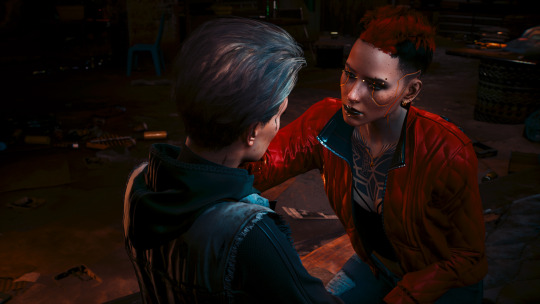

Lemme just wipe off your cheek real quick...
Val needs family. She doesn't know it, but that's why she gravitated to Jackie and Lupe. It's why she calls Panam for help in her canon. Rosalind represents family in a different way. She's the mother who knows what's best, who cares about "her" people, and Val doesn't realize how much she needs that attachment. Several times during the rescue, Ros displays affection and concern for her—when the building collapses before the Chimera fight, during the Relic malfunction—and combined with the mission to keep her safe, it triggers something deep inside V, a loyalty that she doesn't understand.
Rosalind, on the other hand, just lost a lot of crucial advisors. While we don't know who was on board aside from So Mi, we can guess that there were high ranking staffers, such as communications, security, and campaign, plus her own personal assistant and Secret Service agent. She has no one. She is vulnerable with V, admitting that she doesn't know what to do, that she has no one; and V's response is to remind her that she's there, and she's determined to get her out of the situation. Loyalty is something Ros values highly, and here is this merc tasked with saving her, but who sees the situation as more than just another gig; who has become personally invested in protecting her. It's intoxicating to have someone who's unflinchingly loyal to you, and who has seen the real you.
Once they reach the safe house, things escalate because of the mix of all those emotions, plus all the adrenaline and endorphins from the escape. It becomes more than just a hookup, but because of their situations (Ros's, let's be real), they both know it's an untenable relationship. Their time is bittersweet because of that knowledge.
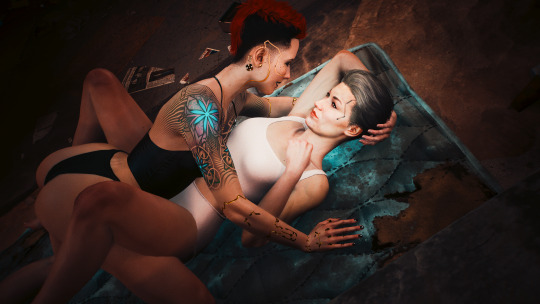
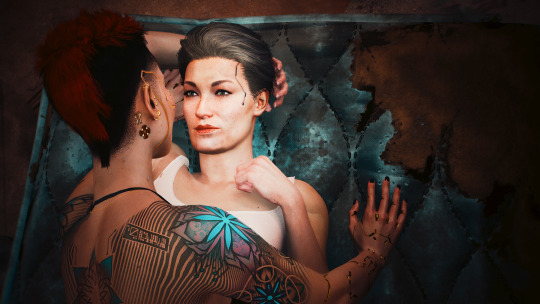
Just squint a little and the Dogtown apartment isn't that bad!
Continued after the cut...
Later after the events of PL, they stay in touch, and there is affection between them still. Ros reaches out by text for fashion advice on the magazine shoot. They both agree that V isn't the right person for the job, but Ros knows she'll at least be honest. Later the acting campaign manager thinks having Ros take photos with the merc who saved her life in Dogtown would be good ad material, so Ros recruits V to the photo shoot.
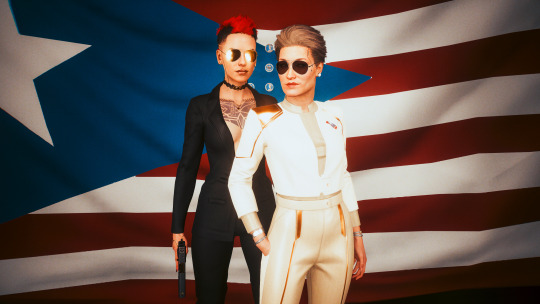
Note: add at least one eagle for the "real" patriots
V uses the photo shoot to her advantage and successfully lobbies for the dinner date Rosalind promised. They have it that evening at Embers, as it's easy to secure for VIPs. Ros wants to know what V expects, because surely she can't think there is hope for a real relationship; but V wants whatever she can have. At this point, she knows she's crazy about Rosalind, while Ros is in denial herself over how much she cares about V.
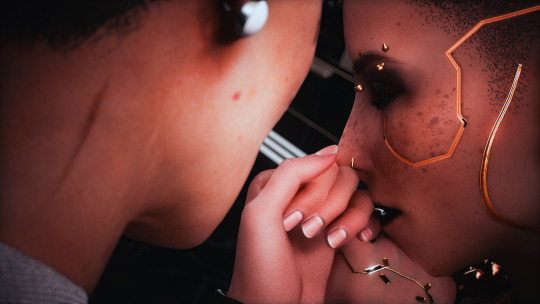
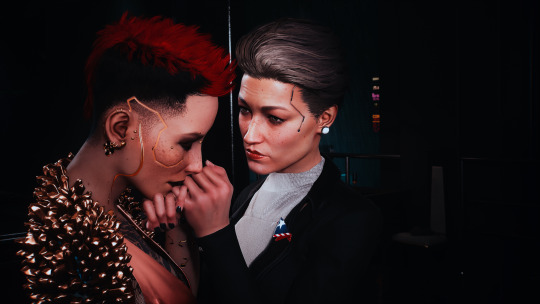
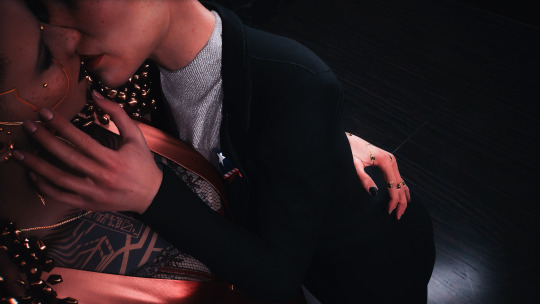
“Where do you think this will go, V?” Rosalind's voice is soft and melodic. She doesn’t know, doesn’t care. She needs something, will take anything. “Hopin’ the first stop is my bedroom,” V says and gives her cockiest grin, but it quickly fades. “After that? Kinda up to you, yeah?”
They spend the night together and Ros decides to give it a try. They officially start seeing each other, but in secret and only when Ros has reason to visit NC. The new mayor provides a good excuse, so Ros visits under cover of extending diplomatic ties, and providing an opportunity for date night with her merc.

It's good to have powerful friends, like the new mayor of Night City.
After a few months of this, they slip up and the media catch wind that the President is spending time with the merc who saved her life in Dogtown. The campaign manager wants to use the media frenzy by spinning it as Rosalind recruiting V as her personal bodyguard, while still encouraging theories about their secret romantic relationship so the screamsheets will go crazy over it.

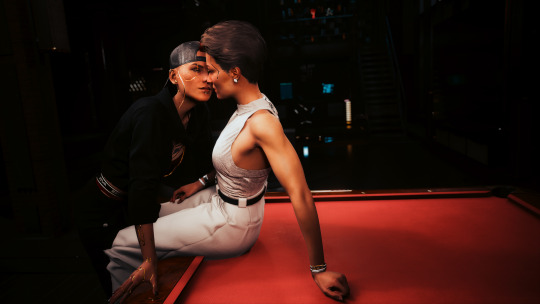
Eventually people are gonna notice when AF1 keeps showing up in NC airspace.
At that point V is ready to upend her life for Ros. She agrees to the plan and moves to D.C. The media eats it all up, and suddenly the only thing the NUS cares about is whether the President and her merc are fucking (they are). Eventually they transition to openly dating, and the President's approval rating shoots up by having a partner who humanizes her and makes her more likeable.
#rosalind myers#president rosalind myers#madam president#valerie vermilion#streetkid!val#myers x v#myers x fem v#milfguard#aka president's merc au#wlw ship#cyberpunk 2077#cyberpunk 2077 photomode#cp2077edit#cyberpunk photomode#videogame photography#my screens#cyberpunk 2077 phantom liberty#phantom liberty#phantom liberty spoilers#shippy sunday#shippy everyday#hands#val lore#streetkid val things#rosalind thoughts#the one of her scar while val is kissing her hand 🥴#but also them on the dirty mattress 🥺#❤️💙#long post#myers for president 2078
67 notes
·
View notes
Text
The Jedi Master.
𝐓𝐨𝐧𝐲 𝐒𝐭𝐚𝐫𝐤 𝐱 𝐒𝐨𝐧 𝐎𝐂!𝐑𝐞𝐚𝐝𝐞𝐫
swearing, sexual innuendos.
Definitely not my best. But enjoy.

Atlas Stark was hunched over his workbench, engrossed in his work. His latest invention seemed to have a mind of its own, as sparks flew and mechanical parts defied the laws of physics.
In the midst of the chaos, a stray bolt flew out of the contraption and struck him in the leg. He winced in pain, trying to hide it from his trusty AI assistant, Blue.
"Ah! Blue delete that footage."
"As you wish, Jedi Master. Miss Potts has prepared a system if you get hurt it alerts her."
"Ugh...Blue can you just can me Jedi?" He asked him, while he grabbed a paper towel to dab his cut with.
"As you wish Jedi."
He looked over to see dummy with a hat on his head. Dummy used a broom to clear the rubbish off the floor.
"Dummy. Hi, Dummy. How did you get that cap on your head? You earned it buddy."
He walked toward the robot. "Hey. Hey! What are you doing round in the corner? You know what you did. Blood on my mat, handle it."
He got on the lab counter and started jumping up and down. "Jedi, may I remind you that you've been awake for nearly seventy-two hours, working on them."
Blue was addressing the Iron Man, and Iron Legion suits that are in their glass cases.
"Focus up, guys. Good evening, and welcome to the birthing suite. I'm pleased to announce the imminent arrival of your bouncing, Motherfucking bad-ass, baby brother." Atlas announced to Dummy as he recorded him with a camera.
"Start tight and go wide, stamp in time. Legion 4...7 autonomous prehensile propulsion suit test. Initialize sequence."
He raised his hands and motions to activate the new suit. "Blue, drop the beat."
XXXTENTACION'S Look at me started playing, he move with the music then pointed it his arm where he had been injured toward the dismantled suit on the table opposite, nothing happens.
"Come."
He squeezed his arm where the cut is trying to get the suits attention, Atlas huffed and then he hit the cut a few times.
He pointed to his arm again and this time a part of the suit flies over to him and attached itself to his han, it extended to his arm and shoulder
He then pointed to his other arm toward the suit and the second part attached itself to his hand and arm,
Atlas laughed in excitement. "Alright, I think we got this. Send 'em all."
The leg part flies over and attached itself to his leg, then as another part flies over it crashed into one of the Iron Legion suit glass cages, then another part hurls itself at me and he deflected it with his arm making it crash.
"Probably a tiny bet fast, slow it down. Slow it down just a..."
Suddenly another part of the suit shot over and he ducked as it narrowly missed hitting him in the head.
"...little bit." Atlas finished his sentence.
The other parts fly over and attached themselves with force to his back and crotch area.
"Cool it, will you, Blue?" He suggested.
Then all the other parts shoot over and get attached to him, accept for the final face piece, which just hovered, facing him.
"Come on. I ain't scared of you bitch."
The face piece flies over and he flipped over to grabbed the piece and finally the Iron Legion suit is fully attached to him.
Atlas smirked in the suit. "I'm the best."
At that moment, one of the stray pieces of the suit shoot over to him, knocking him down, which knocked the entire suit, except for the head piece, off him.
"As always, Jedi, a great pleasure watching you work."
Rhodes, Atlas, and Tony are at a bar and they see Joan Rivers making fun of the Iron Patriot suit on TV.
Rhodes was turned facing the tv in his seat. "It tested well with focus groups, alright?"
"I am Iron Patriot..." Tony mocked him in a robotic voice.
Rhodes sighed. "Listen, War Machine was a little too aggressive, alright? This sends a better message."
"It sounds horrible, I mean War Machine to Iron Patriot it sounds like a two-year-old named it." Atlas joked earning a chuckle from his father.
Tony leaned in closer to Rhodes. "So what's really goin' on? With Mandarin. Seriously, can we talk about this guy?"
"Yeah tells us the tea." Atlas smiled.
Tony and Atlas move closer to Rhodes, both having a smirk on their faces.
"You guys are freaking me out. It's classified information, smarties Okay, there have been nine bombings."
Atlas gave him a confused look. "Nine?"
Rhodes nodded. "The public only knows about three. Here's the thing, nobody can ID a device. There's no bomb casings."
"You know we can help, just ask. I got a ton of new tech, I got a prehensile, I got a...I got a new bomb disposal. Catches explosions mid-air." Tony offered.
Atlas nodded. "They're very cool bombs."
Rhodes raised his eyebrows. "When's the last time you guys got a good night's sleep?"
Tony shrugged. "Einstein slept three hours a year. Look what he did?"
"He went crazy." Atlas deadpanned.
"People are concerned about you, Tony. I'm concerned about you."
Atlas looked at Rhodes in disbelief. "Wow, I don't exist."
Tony groaned sitting back in his chair. "You're gonna come at me like that?"
Rhodes shook his head. "No. No, look, I'm not trying to be a dic..."
A little girl and a boy come up to their table the girl holding a picture of a drawing she drew.
"...tator." Rhodes continued.
"Do you mind signing my drawing?" The little girl asked Tony.
Tony looked over at Rhodes. "If Richard doesn't mind. [to Rhodes] You alright with this, Dick?"
"Fine with me."
Tony looked at the drawing of himself in his Iron Man suit that the girl has drawn.
Tony looked at the little girl. "What's your name?"
"Erin." She answered.
Tony looked at the boy standing next to him. "I loved you in A Christmas Story, by the way."
As Tony is signing Erin's drawing. Those continued their conversation from earlier. "Listen, the Pentagon is scared. After what happened in New York... aliens, come on. They need to look strong. Stopping the Mandarin is priority, but it's not..."
"It's not superhero business, I get it," Tony argued.
"No, it's not, quite frankly. It's American business."
"That's why I said I...got it." Tony sighed, suddenly as Tony is signing the drawing he looked ill, he placed his hand on his face.
"Are you okay?" Both Atlas and Rhodes questioned.
Tony looked up at Rhodes. "I broke the crayon."
"Are you okay, Mr. Stark?" Erin asked him.
"Take it easy. Dad..." Atlas spoke.
The little boy puts a drawing of Iron Blue in front of Atlas to sign.
Atlas can start to feel like something build up inside him, the room feels like it's getting smaller, louder, hotter and he feels itchy.
Little Boy leaned into Atlas's ear. "How did you get out of the wormhole? How did you get out of the wormhole?"
Suddenly Atlas raised out of his chair and walked off.
"Atlas!" Rhodes called after him.
"Atlas!?"
Rhodes and Tony followed Atlas as he walked out the bar.
"What'd he say?!" Tony asked Rhodes who looked at him confused. "What?"
"The kid said something that freaked him off."
"Sorry. Have to check on the suit...make sure...okay." Atlas stood up in the suit.
Atlas stepped into his Iron Blue suit that was parked outside the bar and collapsed onto his knees.
"Check the heart, check the...check the umm the t-the uhh...is it the brain?" He stammered.
"No sign of cardiac anatomy or unusual brain activity," Blue informed him.
"Okay, so...what the fuck was it?"
"My diagnosis is that you've experienced a severe anxiety attack."
Atlas groaned. "Oh, lovely."
Tony knocked on the Iron Suit's head, people have gathered around them watching the three of them.
"Come on, Atlas. This isn't a good look, open up." Rhodes told him.
"Sorry, I gotta banana split." Atlas blasted off in his suit.
Rhodes looked up in the sky. "When are you going to be able to control him?"
Tony sighed. "Don't know... As long as we don't get killed by the heat this week I'll try and control him."
Tony patted Rhodey's shoulder and walked off to his car as Rhodey smiled and shook his head.
#tony stark#tony stark x reader#natasha romanoff x reader#atlasstark#marvel#marvel mcu#mcu#wanda maximoff#wanda maximoff x reader#wanda maximoff x male!reader#war machine#natasha romanoff x male!reader#natasha romanoff#natasha romanov
26 notes
·
View notes
Text
Title: A Game of Fates
You awoke on cold cobblestones, the sharp chill seeping through your clothes. The air was heavy with smoke and the faint scent of damp earth. This wasn’t your room, wasn’t your time. Your head throbbed as memories of binge-watching Moriarty the Patriot swirled in your mind, an impossible connection forming between fiction and reality.
"Lost, are you?"
The voice, low and melodic, sent shivers through you. You turned your head to see him—William James Moriarty. His golden hair gleamed under the faint gaslight, crimson eyes studying you with a mixture of curiosity and calculation. He wasn’t supposed to be real, yet here he was, standing before you like a dream come alive.
"I..." You faltered, your words caught in your throat. His presence was overwhelming, magnetic.
William’s lips quirked into a soft smile, one that didn’t quite reach his eyes. “Strange. You don’t seem like someone who belongs here.” He stepped closer, his polished boots silent on the cobblestones. “Your attire, your demeanor—it’s almost as though you’ve wandered in from another time.”
You swallowed hard, his perceptiveness unnerving. How could you explain the impossible truth? That you weren’t from this world, that you had fallen into a place where fiction bled into reality?
“I... suppose you could say that,” you murmured, avoiding his piercing gaze.
He tilted his head, a golden strand of hair falling into his eyes. “A curious answer. I’m sure there’s more to it.” He extended a gloved hand toward you. “Come. It’s unwise to linger here, especially for someone as out of place as you.”
Against your better judgment, you took his hand. His touch was warm, his grip firm yet gentle. As he guided you through the dimly lit streets, his voice cut through the silence.
“Tell me,” he said, glancing at you sideways. “What is your name?”
You hesitated. “Y/N.”
“Y/N,” he repeated, as if tasting the syllables. “A name I won’t forget.”
The two of you walked in silence for a while, your surroundings blurring as your mind raced. This was William Moriarty—the criminal mastermind whose brilliance and morality made him both a hero and a villain. You couldn’t trust him, yet the warmth in his touch and the softness in his voice made it hard to pull away.
He led you to an elegant townhouse, the interior far cozier than you’d expected. A fire crackled in the hearth, and the faint aroma of tea filled the air. He gestured for you to sit, his sharp eyes never leaving you.
“Now,” he said, settling into the chair opposite yours. “You’re an enigma, Y/N. And I find enigmas... fascinating.”
Your heart thudded painfully in your chest. “Why do you care?”
A shadow passed over his face, and for a moment, you saw something vulnerable in his gaze. “Because I’ve learned that everything happens for a reason. People don’t cross paths by chance.” He leaned forward, his voice lowering. “And you, Y/N, are no ordinary passerby.”
The intensity of his words left you breathless. You wanted to tell him the truth, to admit that you knew who he was, that you’d seen his world through a screen. But before you could speak, a loud knock echoed through the house, shattering the quiet.
William’s expression darkened. “Stay here,” he ordered softly, rising to his feet with the grace of a predator.
You watched as he disappeared into the hall, your pulse quickening. Something wasn’t right. The air was heavy with tension, as though the house itself held secrets. You felt an inexplicable pull toward a desk in the corner, a single letter lying atop it.
Curiosity got the better of you, and you picked up the letter. The seal was broken, the contents hastily scrawled. Your eyes scanned the words, and your blood ran cold.
"The stranger is a threat. Eliminate them before they become a problem."
Your hands trembled as you heard footsteps behind you. You turned to find William standing there, his expression unreadable.
“Ah,” he said smoothly, his eyes flicking to the letter in your hand. “I see you’ve found one of my little mysteries.”
“Is this about me?” you whispered, your voice trembling.
He stepped closer, the air between you crackling with tension. “You’re clever,” he murmured, his voice a mix of admiration and warning. “Too clever for your own good.”
Before you could respond, he reached out, his fingers brushing against your cheek. “But I don’t believe in wasting potential. You’ve captivated me, Y/N. Perhaps we can solve this mystery together.”
His touch was electric, his words both a promise and a threat. You were caught in his web now, and there was no escape. But a part of you didn’t want to escape.
Because if this was a game, you wanted to play it with him—no matter the cost.

#yuukoku no moriarty x reader#moriarty x reader#william james moriarty x reader#William James Moriarty#moriarty the patriot
10 notes
·
View notes
Text
It fucking sucks for everyone involved. Mav knows that and the longer this apocalyptic (that's how it feels, at least) goes on he also knows the harder it is to follow the rules. But he knows that it means it keeps Ice safe, that's all that matters. The treatment is rigorous enough, but their self-enforced isolation abolishes their creature comforts. No late night cuddling, morning forehead kisses.
Taking leave for treatment cut out a lot of Ice's contact with the general public, but for Mav his world keeps ticking. The Darkstar is a year away now, from being finished and it's all coming down to crunch time. The supply chain market is affecting even military orders from suppliers, the dead line feels like it's getting extended every week. It means that every day he's out dealing with people whilst the rest of the world is locked up. He's metres away from people, masked to the nines and face shielded.
He's this close to showering in Dettol. Because of his exposure, he and Ice made the decision three weeks ago that whilst Ice underwent another round of treatment it's better that they not risk Mav carrying something into their home. It's left Maverick confined to his barracks. The mess hall is...other wordly. He's never seen it so empty. Every where is empty, sectioned off.
It's wearing his patience thin. Maybe that's why he lost his shit.
They're young, maybe with young parents and young grandparents and over all boringly healthy family. Maybe they just couldn't take the dystopian world anymore and just needed to talk to someone without a mask. Maverick doesn't care.
Two of them in the common room, masks down. A half metre apart. Maverick walks past, tired, missing Ice and just at the end of his tether. He falters, doesn't recognise them. Maybe the anger forces their identities from his mind.
"Are you fucking stupid?" He spits, feeling his breath fill his N95 mask. "Are you fucking stupid?"
The ensigns jump apart and pull their masks up but it's too late.
"If I see you doing that shit again you are gone. Do you understand me?"
They nod joltingly. But it's not enough. He's angry.
"We are the gold standard. The fucking NAVY. I'm on the phone every fucking night with Admirals, congressman. The country is looking to us to see their patriotic fucking aviators doing the right thing. I get this is hard, believe me. I'm here, protecting my husband by isolating from him as he undergoes cancer treatment. I don't want to see this shit ever again. You transmit the virus, and they die, it's on you. You carried it, you killed them. Get to your fucking barracks."
The ensigns scram and he's left breathing hard, tears pricking his eyes.
That night he's sending a voice message to Ice when his husband sends a message first.
I: I heard you lost it today.
"...The supply- Yeah I did," he continues in the voice message. "Couple of ensigns standing close without masks on in the common area. Told them they'd be gone if I caught them doing that shit again."
He sends a message and waits for Ice to hear it and text back.
I: Yeah no, Hollywood caught wind of the whole thing. Test, isolate, come home. Just for a while. We can forget the word for a while.
M: I will when you finnish immunotherapy. I'll take leave, let Hondo watch the darkstar for me.
I: We'll watch the world burn together
--
inspired by this post by @fist-of-the-fleet
paraphrased quotes from tom cruises covid rant if yal couldn't tell
#idk what th emilitary did during covid except that in australia they door knocked people to make sure they were home lmao#pete maverick mitchell#icemav#tom iceman kazansky#iceman x maverick#top gun maverick#i should be working on wips
95 notes
·
View notes
Text
snip from an upcoming 15k shadowgast PWP oneshot where essek pretends to be a mannequin for caleb to model jewelry. i’m insane over these two thanks
...
Caleb holds the magazine in his hand like a delicate crépe, jostling it upside-down to let the sheafs of paper separate out onto the table.
It’s old parchment from at least three seasons ago. That is, seasons of being left out in the elements, given the disastrous state of the thing—he was going to cut the pages out either way, so there was no use in keeping it intact.
The night outside the window of his cottage smells like icewater, crisp and wintrily cold in the creep towards early morning. Hours of work have brought a red strain to his eyes that has him removing his spectacles and wiping them on his sleeve, sitting back in his desk chair until it creaks.
He doesn’t know exactly when Rexxentrum began to import fashion editorials from around Wildemount, but it hadn’t been during his childhood. That, or it hadn’t extended to Blumenthal, that was for certain.
In his hands he holds an edition of Rogue magazine. What year it is from, he cannot tell. In truth, the only pages he needs are the ones featuring an insider look at Rosohnan trends. Not a very patriotic thing to include, no—especially not by an Empire imprint. But it is the only way he can copy and store reference images of many pieces at a time. His memory is a gift, but he is no tailor, nor designer, and he cannot recreate a garment without first understanding it to a structural degree. Sometimes to the degree that the original designer must have had whilst drafting.
In this way, he is reverse-engineering a craft in which he has no formal training. Which is almost like spellcraft, if he wants to be funny about it.
He flips the parchment back and forth. A monochrome, glossy illustration flashes on either side: two drow men in ensembles of jewelry so thin, so white with shine, so consistent in their glimmer, that it is as though they are wearing pure rainwater. For a moment he allows the haberdashery of his mind to outfit an Essek in one such garment, though the lack of modesty leaves him feeling warmed and embarrassed. He ushers the thought away. He will see the sight in person soon enough.
Caleb takes his metal scissors and begins to cut. The drow men, with their long necks and lean bodies, file away into a scrapbook with a bit of paper-tacky. The Essek of his mind lives undecorated yet another day.
39 notes
·
View notes
Note
For Leo - battery percentage asks - 65%
[battery-percentage themed asks]
65%. How'd they get along with their parents and/or other relatives?
OH, I ACTUALLY HAVE NEW THOUGHTS ABOUT THIS ONE! That I'll also take your thoughts on!
First of all, starting on the semi-more common knowledge of Leo is that Leo didn't get along with either of his parents, lol. Mostly he butted heads with his father, Vorza, but if I'm recalling correctly, his mother was also one of the high-society types we said, and Leo was just never very comfortable in those kind of scenes. There were probably plenty of parties attended where Leo, frankly, couldn't stop messing with the collar of his shirt because it felt scratchy and at least metaphorically suffocating to have to play pleasantries with a bunch of people they only half-knew, at best, or barely knew of at times.
His mother never approved very highly of him either, but Vorza is the one that voiced most of it. Mother's looks were only ever silent, sharply-lined frowns framed by a crooked brow and thick, vibrant lipstick, but Father's disappointment and wrath was always cutting and towering over him. Vorza I think delivered most of his reprimands and... had a bit of a heavy-handed involvement in what expectations Leo grew up with. Be polite, fall in line, behave himself, cut the backtalk, and, eventually, of course, the frustrations that this wasn't hard for his older sister and younger brother to understand, so what made Leo so hardheaded?
So, you can imagine family gatherings and outings were far from Leo's favorite thing. And while I've been chatting with another friend lately, I've also found myself amused Leo and one of my agents, Alucren, must've come out of the same place design-wise for me and I need to stop teasing Tyr about his interest in people with black hair, is kind of the short of it, lol. But long overall story short, I remember bemusement that Leo's the only dark haired kid in the line-up if I recall correctly, so I might've started joking Leo and Alucren might be cousins because ironically they're also exactly the same age. Which has been really amusing to entertain, so I may have found more relations for our kids, if you're down. xD
Because it also implies something really interesting for Alucren and kinda. patches up something I haven't quite worked out for him and that's... that I know, theoretically, Alucren had a positive relationship with his own parents and his three older sisters, but he also refuses to tell me absolutely anything about his parents, so there's nothing particularly conflicting in that potential family-tie. Alucren's family is just heavily involved in domestic projects for the Empire; Alucren's parents were likely either high-profile donors and regular visitors to a number of Kaasi Imperial history and arts museums, or potentially held positions there themselves - and the further back generations and some of the extended family surely did.
Anyway, the capstone of really why this amuses me so much is frankly Leo and Alucren wouldn't get along at face value, lol. Plainly, Leo would think Alucren's an ass (and he'd be at least somewhat correct) and Alucren would share in the majority of Leo's family's disdain for his... [gestures] disorganization? Lack of patriotism for their fine Empire? All I'm saying is that if they are related, they've been dropped at the side of a room by their parents and told to play nice and both of them grimaced deeply about having to put up with one another and Alucren has a by-miles better social poker face than Leo ever did.
And neither of them would be particularly impressed by the other's life trajectory since then. Leo would find him sketchy on principle for being recruited to Imperial Intelligence and Alucren would find some way to make a cutting insult out of course you'd end up a galactic criminal. Family, right? xD
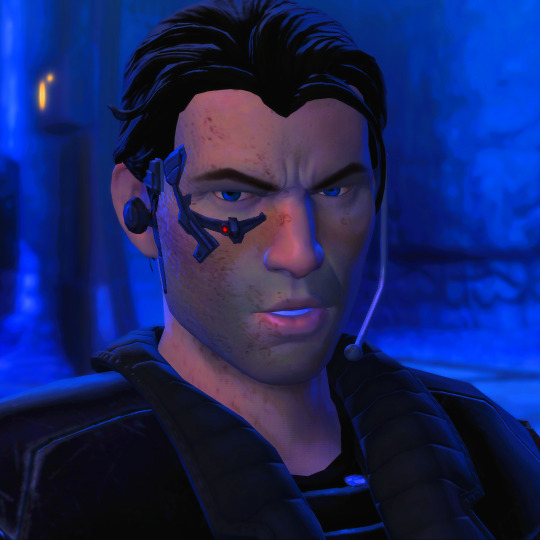
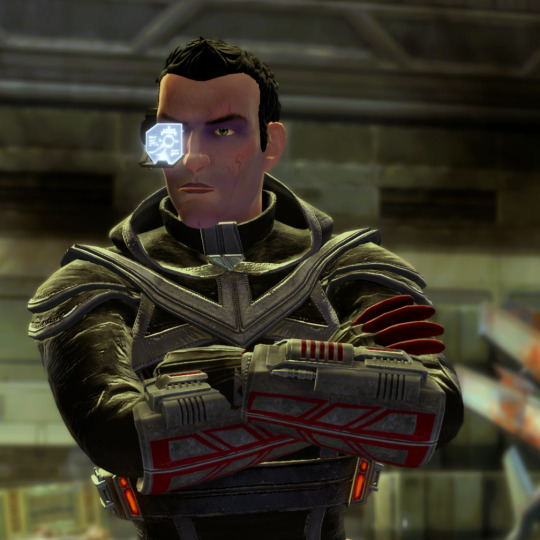
#answered#dot talk#ch: leo ashold#ch: alucren#also it's not super important but it extra amuses me#alucren Is for once taller than leo but leo has small dog energy about it and therefore would still manage to bully alucren#which frankly leo would do regardless of any blood relation or not bc he'd still think alucren's Insufferable#and what is leo here for except to be a menace?#it'd be so funny to lock them in a room though. is the core of what i'm saying.
3 notes
·
View notes
Text
Yoooooooo!
Margaret Martin has a whole ass speech in the extended cut. It’s to Susan about how their mother is the North Star who watches over them (comes right after their father visits his wife’s grave. Her name on the headstone is the only thing in the movie that lets us know she has one).
5 notes
·
View notes
Text
OC Time: Dr. Tanke Drummer
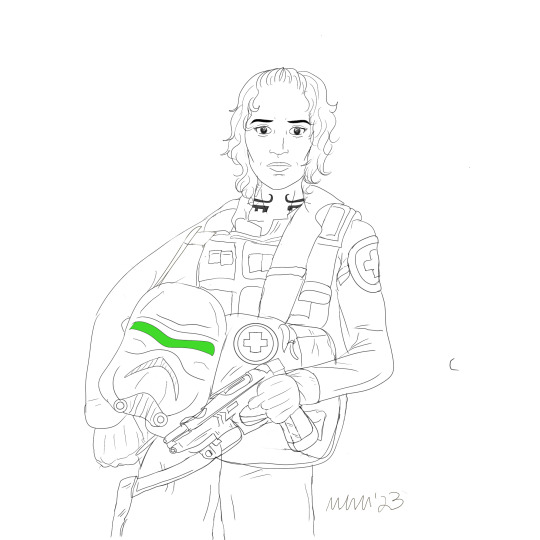
Name: Tanke Drummer, MD
Nickname/s: Mi kori (Timon), Dusiwala (Miriam), Ses (Sjael), Niimama (Blid, Tro, and Haber), Doc (everyone), Scary Doc (also everyone)
Age: 37 (at beginning), 40 (at end)
Species: Human/Belter
Height: 6’4
Weight: 165 lbs
Gender: Female
Sex: Female
Hair: Dark brown, cut into a wavy Bob, partially pinned back and out of face.
Eyes: Large dark brown-black, intense eyebrows.
Pronouns: She/Her
Sexuality: Bi/Poly
Relationship status: Married in polyamorious triad. Tro is not her biological child, but Blid and Haber are.
Occupation: Chief Intake Physician at Medina Station
Current location/from: Medina Station/Ganymede, Sol System
Voice: Alto, with strong Belter lilt from working in Ceres hospitals.
Personality: The spirit of the Belt in the body of a loving mother, sister, doctor, and wife, Tanke is the fiery rock of her extended family. The firstborn of a physician father and lab manager mother, Tanke was raised with high expectations, especially as her mother’s mental and physical health deteriorated with the many pregnancy losses that occurred between Tanke and Sjael’s birth. Her grandfather, the legendary union organizer and mining engineer, Sjaelland Roose’s death during an attempted organizing event with the OPA pushed Tanke to eventually take time off from her studies, and serve as a medic on an OPA-Free Navy vessel, attacking Earth and Martian ships. After two years, she became disillusioned with the OPA-Free Navy’s antics, and returned to school, where she completed her MD. She married her spouses, who also left the OPA at the same time, shortly afterwards, and started a family on Ceres. Motherhood and her work as a physician are what define her, and she is both fiercely loyal and incredibly defensive of her family. She sometimes struggles with letting go of bad memories, and holding grudges. Her sister Sjael’s gentle nature is both inspiring and irritating to her, as she views herself as her sister’s protector.
Flaws: Tanke suffers from PTSD and anxiety from the violence she’s witnessed (and DONE) in both the hospital and during her time with the OPA, which comes through in her rage and her especially nasty tongue. She curses like a sailor, and has no problem threatening and insulting people whom she views as a potential harm to her loved ones. This scares away many potential allies and friends. She is also a drinker.
Likes: Long walks, guns, taking care of others, beer, whiskey, her family, new medical discoveries, bread, big bowls of noodles, her daughter’s art, sleeping in, her sister’s cooking.
Dislikes: Messes, not having things scheduled, being undermined, seeing her loved ones upset, men who date her sister, misbehavior, procrastination.
Desire: Tanke, despite her ferocious attitude, is a loving person who wants a secure future for the people that she adores. No one is more important to her than her immediate family, and she will see red if one of them is in harm’s way. A patriotic Belter through and through, she also wants a stable future for her people.
#cloneforce99#thebadbatch#tbb#the expanse#belter#fanfiction#starwarsfanfiction#tanke drummer#oc prompt#oc character#oc that's a doctor#and a mom#and bisexual#veteran character#beltalowda
8 notes
·
View notes
Text
Thomaz Vidigal
Americans stereotype because of their geographical ignorance
What are the main causes of the use of stereotypes by people from Western society, (particularly North Americans) and how does the domestic emphasis on American geography/history in schools, leading to geographic illiteracy contribute to this phenomenon? By understanding the results of this educational/cultural approach and the propagation of stereotypes in popular culture this essay seeks to cut American stereotyping by its roots. The thesis is backed up by various articles and authors.
USA citizens attribute stereotypes to other countries for many reasons. Although American stereotyping can be attributed to factors highlighted by Bruce Stokes in his examination of the US people's perceptions of Japan, USA citizens attribute stereotypes to other countries for many other reasons. This exemplifies the generalization, exaggeration, and selective perception of foreign cultures by Americans. In this example, we will analyze the stereotypes Americans hold of the Japanese (mostly positive), associating them with attributes like hard and honest. This favorable perception is supported by means of over 90% of Americans linking the Japanese with being hardworking. Negative stereotypes like intolerant, aggressive, or selfish, are less common. Stokes' findings underscore the impact of stereotypes on international relations, trade, diplomacy, and cultural exchange. Finding mutual understanding between cultures is one of the most important objectives of current society. A good example of how beating these stereotypes can change our society for the better is the story of Daryl Davis, a black musician who convinced over 200 members of the Ku Klux Klan to leave the clan by focusing on individual characteristics rather than group identity. The psychological and literal forces behind stereotyping need to be directly targeted and methods such as storytelling and personal connections need to be implemented to break down stereotypes and build empathy.
Patriotism focuses education on domestic affairs, making Americans geographically ignorant. However, despite the USA having a high school system world ranking, patriotism coupled with nationalism, common in the United States, reinforces the insular educational system, perpetuating North Americans' focus on domestic geography and culture." This exacerbates stereotyping, as familiarity with other countries reduces the tendency to rely on false or exaggerated stereotypes. Zach Fitzner's article underscores the visible geographical illiteracy among USA’s population, illustrating a root problem of their global knowledge deficit. The issue extends beyond schools, affecting college-educated individuals and adults, as evidenced by studies that reveal a significant lack of understanding of global geography.
This ignorance impacts geopolitics and foreign affairs. Although, this ignorance not only fuels stereotyping but also directly impacts U.S. policy decisions and national security. The inability of Americans to answer crucial geopolitical questions, such as the global presence of U.S. troops or political alliances. Furthermore, all of these pose a threat to foreign policy. But can it lead to ill-informed decisions affecting international affairs and national security?. Fitzner's research emphasizes the need to reform geography education in American schools, as a greater focus on current global events is vital to bridge the gap between historical knowledge and contemporary global issues.
In conclusion, the widespread American practice of stereotyping is intrinsically linked to geographic illiteracy. Addressing these knowledge gaps is imperative to create an informed and globally aware society. Understanding how nations perceive each other has implications for international relations and geopolitics in an increasingly globalized world. To work towards stronger, more cooperative global relationships, both Americans and the international community must prioritize a deeper understanding of each other's cultures and societies.
5 notes
·
View notes
Text
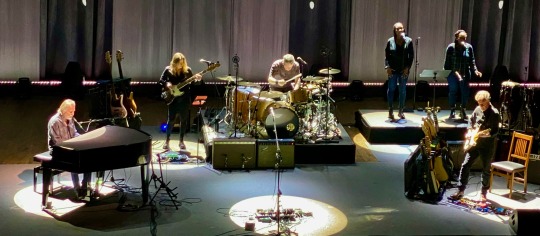





Jackson Browne at Palace Theatre, Columbus, Ohio, June 3, 2023
With a fat songbook so packed with quality deep cuts and hits that he can’t possibly play all - or even most - of them, Jackson Browne walked on stage unannounced and by his lonesome June 3 in Columbus and kicked off his U.S. tour with …
… a solo-electric cover of Warren Zevon’s “Don’t Let Us Get Sick.”
It was an unexpected, gutsy and successful move that immediately won over the nearly sold-out Palace Theatre. It elicited warm applause as Browne sang Zevon’s prayer and immediately established his 74-year-old voice is much younger than its chronological age:
Don’t let us get sick, don’t let us get old/don’t let us get stupid, all right/just make us be brave and make us play nice/and let us be together tonight
It set the tone for a loose evening that found Browne engaging with the audience, teasing his guitar tech and heaping well-deserved praise upon the members of his freshly pared-down group.
After the Zevon number, Browne brought out his powerhouse “half-full band” - Greg Leisz (Watkins Family Hour, Bob Weir and Wolf Bros) on lap steel, acoustic and electric guitars; his wife, Mai Leisz, (David Crosby) on bass; drummer Mauricio Lewak; and singers Chavonne Stewart and Alethea Mills (who doubled on percussion) - and got right down to business with the show proper, which was generous across 60- and 90-minute sets.
Saying “I wanna play them all,” but knowing he couldn’t possibly do so, Browne, who accompanied his bandmates on acoustic and electric guitars and piano, did cover 49 years of music making, crafting a setlist that spanned from 1972’s “Doctor My Eyes” to 2021’s “Downhill from Everywhere,” a warning about the oceans’ fragile health and one of many highlights of the evening.
The reggae-tinged “I Am a Patriot” was another. Though released in 1985, the song seems to have intuited where the United States was headed. And Browne added some new lyrics - I ain’t no xenophobe, he sang - to place it even more firmly in the context of 2023.
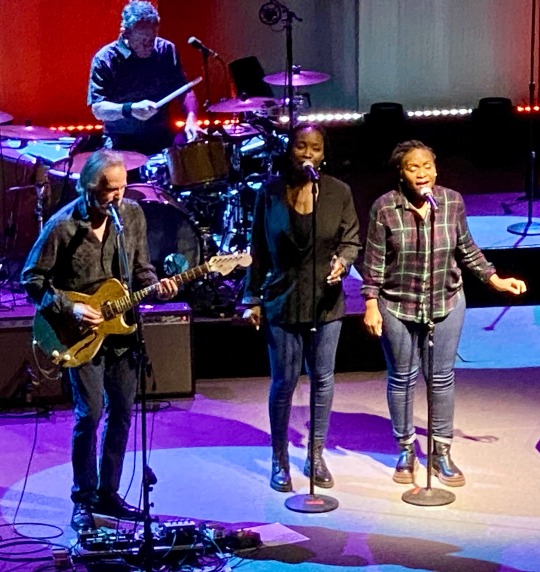

Band members came and went to suit the songs. Stewart and Mills - who sang beautifully on occasional co-leads and in harmony with Browne, with whom they’ve developed an almost-familial blend - left their riser and joined the songwriter down front for “Until Justice is Real.” Greg Leisz and Browne played as a steel-and-piano duo on “Walls and Doors” and the (half) full band dug into “Running on Empty” so deeply that Browne kicked his leg high in the air and turned to stare down Leisz as he offered his take on the solo made famous by David Lindley, who died earlier this year.
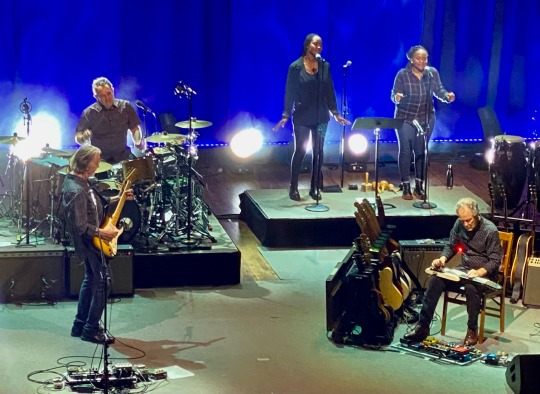
Being the first night of the tour with a new band and a new set, there were a few hiccups. A muffed note here. Some not-quite-honed arrangements there. The occasional false start and botched lyrics. And Leisz’s pedal-steel guitar sat lonely and untouched all evening long, suggesting Browne was calling audibles as the night unfolded.
Someone wanting to hear the records in a concert hall might say these things were evidence of Browne losing his edge. Someone out for the without-a-net experience (put Sound Bites in this camp) might revel in the not-set-in-stone nature that led to such surprises as Browne deciding the first set wasn’t long enough and tacking “For Everyman” on to the end and causing Mai Leisz to run back on stage after assuming break time had come.

The same thing happened to Greg Leisz at show’s end, when Browne opted to play “The Load-Out”/“Stay” and the multi-instrumentalist - who wowed Browne and the concertgoers all evening long - struggled to get his lap steel situated on time. He made it with less than a bar to spare and Browne rewarded Leisz by calling on him to extend his solo, which he did to rapturous applause.
See more photos on Sound Bites’ Facebook page.
Grade card: Jackson Browne at Palace Theatre - 6/3/23 - A-
6/4/23
#jackson browne#2023 concerts#greg leisz#watkins family hour#mai leisz#david crosby#david lindley#mauricio lewak#warren zevon#chavonne stewart#alethea mills
6 notes
·
View notes
Text
The Timeless Legacy of AR Rahman in Global Music
Few names in the music industry hold as much gravitas as AR Rahman. Known as the "Mozart of Madras," Rahman has captivated audiences worldwide with his unique compositions that transcend cultural and linguistic barriers. His extraordinary ability to fuse traditional Indian music with modern genres has made him one of the most influential composers of our time. With a career spanning over three decades, AR Rahman has composed music that resonates emotionally with millions, earning him two Academy Awards, two Grammys, a Golden Globe, and numerous accolades. His music is more than sound; it is a language of its own, uniting people from diverse backgrounds. This article delves into his awe-inspiring journey, his ability to innovate, and the legacy he continues to build.
The Early Years and Rise to Stardom
AR Rahman’s musical odyssey began in Chennai, India. Born as A. S. Dileep Kumar, his early life was marked by hardship. Rahman lost his father, a composer, at a young age and had to support his family by working as a session musician. These challenges only fueled his determination to succeed. His exposure to various musical styles in Chennai’s film industry was instrumental in shaping his distinctive approach.
In 1992, Rahman burst onto the scene with Mani Ratnam’s Tamil film Roja. The soundtrack became an instant sensation, earning him a National Film Award and solidifying his place in the industry. The music of Roja wasn’t just a commercial success; it marked a turning point in Indian cinema, ushering in a new era of sound engineering and composition.
Innovative Soundscapes and Artistic Vision
One of the defining aspects of AR Rahman’s music is his innovative approach to sound. Unlike many of his contemporaries, Rahman embraced technology, incorporating synthesizers, drum machines, and computer-based tools into his compositions. This fusion of traditional Indian instruments with cutting-edge technology gave his music an unparalleled freshness.
Albums like Bombay, Dil Se, and Lagaan are prime examples of how Rahman crafts intricate soundscapes. Each song is a meticulously constructed work of art, blending orchestral grandeur with soulful simplicity. Rahman’s music doesn’t just accompany a film; it elevates it, becoming an integral part of the storytelling.
His versatility knows no bounds. Whether it's the ethereal “Chaiyya Chaiyya,” the emotionally charged “Taal Se Taal,” or the patriotic anthem “Maa Tujhe Salaam,” Rahman’s ability to evoke deep feelings through his compositions is unmatched.
Conquering the Global Stage
AR Rahman’s foray into international music began with Andrew Lloyd Webber’s Bombay Dreams, a musical that brought Indian sounds to the West End and Broadway. However, it was Slumdog Millionaire that catapulted him to global stardom. The film’s soundtrack, particularly the iconic “Jai Ho,” earned him two Academy Awards, making him the first Indian to achieve such a feat.
Rahman’s collaborations with global artists like Mick Jagger, will.i.am, and Hans Zimmer further expanded his reach. His ability to bridge the gap between Eastern and Western music has made him a cultural ambassador, introducing global audiences to the richness of Indian music.
A Visionary Beyond Music
Rahman’s influence extends far beyond his compositions. In 2008, he founded the KM Music Conservatory in Chennai, aiming to nurture the next generation of musicians. The conservatory focuses on both Indian and Western classical music, reflecting Rahman’s belief in the power of cross-cultural collaboration.
Additionally, Rahman has used his platform to support charitable causes, including education and disaster relief. His philanthropic efforts are a testament to his belief that music can be a force for good in the world.
Enduring Legacy and Continuing Impact
Today, AR Rahman is much more than a composer; he is a global icon. His ability to reinvent himself while staying true to his roots ensures his music remains relevant across generations. From intimate ballads to grand orchestral pieces, Rahman’s work continues to inspire and captivate.
His journey is an extraordinary story of perseverance, innovation, and artistry. Through sheer talent and relentless dedication, Rahman has redefined what it means to be a composer in the modern world. His influence is felt not just in India but across the globe, where his music has broken down cultural barriers and brought people together.
To delve deeper into the life and achievements of this iconic musician, explore his fascinating journey here.
Conclusion
The genius of AR Rahman lies in his ability to connect people through music that transcends borders and languages. His unique blend of innovation and tradition has not only redefined Indian music but also placed it on the global stage. Rahman’s journey from a humble studio in Chennai to the Academy Awards stage is a story of passion, resilience, and an unyielding commitment to his craft.
As Rahman continues to create magic through his compositions, he remains an inspiration to millions worldwide. What are your thoughts on AR Rahman’s contributions to music? Which of his songs holds a special place in your heart? Share your experiences in the comments below!
Related Articles:
For further reading, explore these related articles:
Yo Yo Honey Singh: The Unstoppable Force in Indian Music
SP Balasubrahmanyam: A Voice for the Ages and a Legacy Beyond Compare
CarryMinati – Rising Hip-Hop Star from India and His Best Growth Tactics
Diljit Dosanjh: A Global Icon of Punjabi Music and Growth Tactics for Independent Artists
For additional resources on music marketing and distribution, visit DMT Records Private Limited.
0 notes
Text
SMART BOMB
The Completely Unnecessary News Analysis
By Christopher Smart
January 21, 2025
LDS TITHING FRAUD CASE — LET THE LORD DECIDE
Well, this could be difficult. Attorneys for the Church of Jesus Christ of Latter-day Saints argued in federal court that allegations of fraud involving billions of dollars in tithing collected over two decades cannot be decided in a secular court. That's right Wilson, it means sending it up to a higher power: Let the Lord decide. Which, if you think about it, is a pretty good defense — if it works. Tithing is a sacred obligation, the Mormon attorneys argued, and as such is off limits under the protections of the First Amendment. It amounts to an intrusion of religious thought. No Wilson, church founder Joseph Smith's Urim and Thummim did not foresee this. Nine plaintiffs are suing the church claiming that Ensign Peak Advisors, the church's investment arm, amassed $100 billion from investing tithing, while not spending any of it on charity or religious efforts. Meanwhile, they say the church spent $1.4 billion on the City Creek Center mall in Salt Lake City. This could get a little tricky for God's real estate angels: is money made by investing tithing the same as tithing — or not. The $100 billion investment portfolio came to light in 2019 by an IRS whistleblower. By hiding the largesse, plaintiffs say church leaders defrauded the faithful so they would not stop donating. But as an apostle once said, ignorance is bliss.
TICK TOCK, TICK TOCK... IS TIME RUNNING OUT FOR TIKTOK?
It's off. It's back on. Trump says he'll save it. We'll see. Four years ago, Trump wanted it banned. Now he loves it. Funny how money can change minds. Some 170 million Americans use the app owned by Chinese company ByteDance. Worldwide that number is in excess of 2 billion. TikTok, a video-hosting service, is a whole world unto itself. It connects creators and influences with new audiences and pushes trends in food, fashion and music and just about everything. It also spreads hate speech, far right extremism, antisemitism islamophobia, racism and xenophobia. It added $2 billion to the U.S. economy last year. Originally designed to sell Chinese goods to people all over the world, it has morphed into the globe's most popular website. In 2022, Mark Zuckerberg and his Meta platforms hired a high-powered lobby firm to create strategies and campaigns portraying TikTok as “a danger to American children and society.” It worked and in 2024 Congress passed a law banning the app unless it was sold from Chinese interests. The Supreme Court upheld the law ruling it did not violate TikTok's First Amendment rights. Yes, and money is speech and corporations are people. So now let's see if it's possible to close Pandora's Box.
THIS TIME AMERICA REALLY IS GOING TO BE GREAT AGAIN
This is going to be so much fun. The 47th President of the United States issued something like 100 executive orders on his first day back in the White House. It was planned to overwhelm regulators, Congress, the news media and everyone else. Gone are the days when Republicans, like Utah Sen. Mike Lee, complained that the executive branch had too much power. Here's part of the to-do list: deport everyone with brown skin; end birthright citizenship to keep them brown people from spawning Americans; close the border to avocado trucks, pardon all those Jan. 6 patriots; end the war in Ukraine, maybe now, maybe later; make Canada the 51st state; put tariffs on everything from China, including Hot Wheels; drill baby drill, lower the price of eggs, keep transgender women out of sports; make polluting great again; cut funding to “woke” schools; cut funding to everything else “woke”; make DEI (diversity, equity and inclusion) programs a felony; ban travel to Gaza, Yemen and California; outlaw teaching of critical race theory (CRT) in middle schools; extend tax cuts for billionaires; replace Obamacare with Trumpcare; weaponize the Justice Department to prosecute any and all Trump naysayers. Well, it's a start, anyway. Nobody said making America great again for certain groups was going to be easy.
Post script — That's a wrap for another historic week here at Smart Bomb where we keep track of the Village People so you don't have to. Hey Wilson, remember the Village People?They were a late-70s disco group who dressed up as various macho gay-fantasy characters — an Indian chief, a cop, a construction worker, a cowboy. Their name comes from Greenwich Village in Manhattan that had a reputation as a gayborhood. Donald Trump adopted one of the Village People's hits, Y.M.C.A. as a theme for is campaign, although it was known as a gay anthem. The band in 2020 asked him not to use the song after he threatened to shoot Black Lives Matter protestors. They later reversed their decision. The Village People are having another moment and performed at some of Trump's inauguration festivities. The only original member of the band, 73-year-old Victor Willis, said Trump really likes Y.M.C.A. "We know this [won't] make some of you happy to hear, however we believe that music is to be performed without regard to politics. Our song Y.M.C.A. is a global anthem that hopefully helps bring the country together after a tumultuous and divided campaign where our preferred candidate lost." Trump took the stage with the band at a rally on the eve of his inauguration and danced as they sang their 1978 hit. You can't unsee it.
Well Wilson, you and the band can guess what's coming next. Tell the guys to dress the part and take us out with a rousing rendition of Y.M.C.A.:
Young man, there's no need to feel down. I said, young man, pick yourself off the ground. I said, young man, 'cause you're in a new town There's no need to be unhappy. Young man, there's a place you can go. I said, young man, when you're short on your dough. You can stay there, and I'm sure you will find Many ways to have a good time. It's fun to stay at the Y.M.C.A. It's fun to stay at the Y.M.C.A. They have everything for young men to enjoy, You can hang out with all the boys... It's fun to stay at the Y.M.C.A. It's fun to stay at the Y.M.C.A. You can get yourself clean, you can have a good meal, You can do whatever you feel... Young man, are you listening to me? I said, young man, what do you wanna be? I said, young man, you can make real your dreams. But you got to know this one thing! No man does it all by himself. I said, young man, put your pride on the shelf, And just go there, to the Y.M.C.A. I'm sure they can help you today. It's fun to stay at the Y.M.C.A. It's fun to stay at the Y.M.C.A.
(Y.M.C.A. — Village People)
0 notes